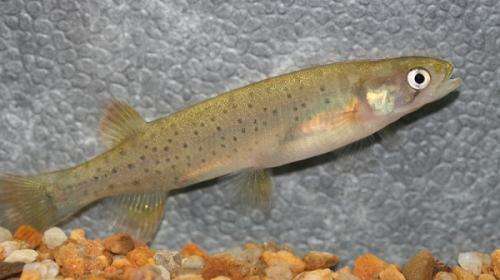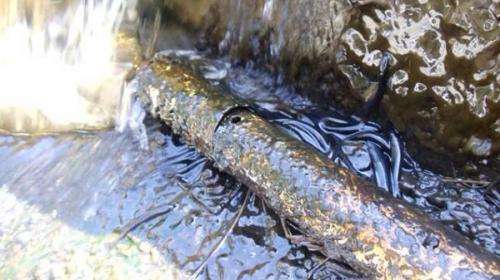Migratory fish scale to new heights

WA scientists are the first to observe and document juvenile trout minnow (Galaxias truttaceus Valenciennes 1846) successfully negotiating a vertical weir wall by modifying their swimming technique to 'climb' and 'jump' over the obstacle during their upstream migration to freshwater habitats.
UWA Albany-based fish ecology expert Dr Paul Close and his colleagues from Murdoch University and the WA Department of Fisheries made the surprise discovery about the critically endangered freshwater fish which is native to southern Australia.
They observed the habits while on a field trip to the Goodga River, east of Albany, between late October and early November 2013.
"We were lucky enough to observe juvenile trout minnow successfully negotiating a vertical weir wall, approximately one metre high," Dr Close says.
"During their ascent, fish used a modified swimming technique to 'climb' the wet concrete surface of the weir."
"They then rested, mid ascent and fully exposed to the air.
"Once reaching the top of the weir, fish used a modified swimming burst to negotiate the top of the weir, and did so with sufficient speed to essentially 'jump' through the air and land in the pool upstream of the weir."
From these observations, the researchers proposed two formal definitions of locomotory strategies employed by fish to negotiate obstacles.
These included 'climbing' or ascending a wet or dry, vertical or near vertical obstacle using modified movement while fully or partially exposed to air and still connected to the substrate.

The second strategy involved 'jumping' or achieving significant separation from the water or substrate.
These observations provide a significant contribution to the field of native freshwater fish research, and particularly that of smaller native species like the trout minnow whose swimming ability has been largely unknown, Dr Close says.
"The ability of trout minnow to 'climb' the vertical weir wall and to 'jump' contrasts with most other Australian native species, and particularly their juvenile stages," he says.
"Less than five per cent of around 205 native Australian freshwater species are thought to posses some ability to climb and jump."
Dr Close says further consideration of the swimming, climbing and jumping capabilities of freshwater migratory species will improve our ability to prioritise mitigation works on in-stream barriers.
"If the management goal is to improve fish passage for accomplished climbers such as trout minnow in south-western Australia, design criteria for fish passage structures such as fish ladders may be less complicated than previously thought," he says.
More information: www.publish.csiro.au/paper/ZO14004.htm
Provided by Science Network WA




















